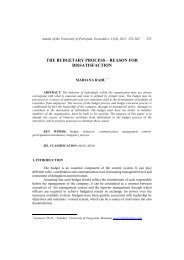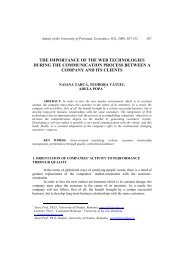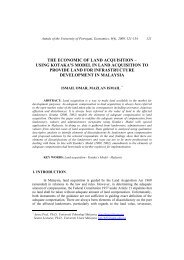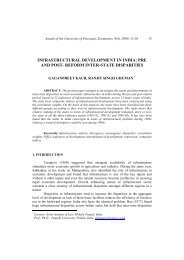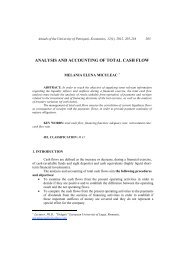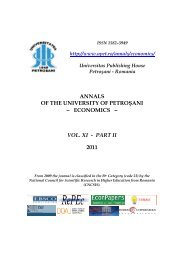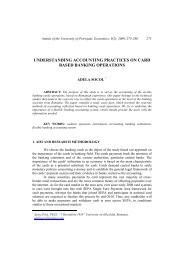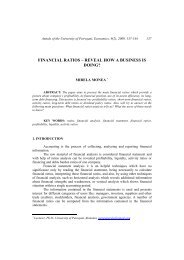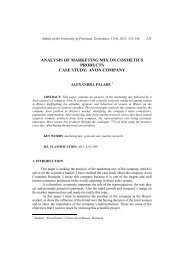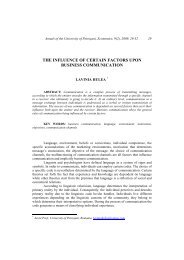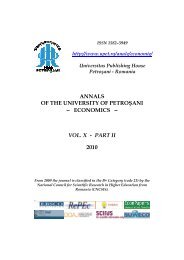annals of the university of petroÅani â¼ economics â¼ vol. xi - part i ...
annals of the university of petroÅani â¼ economics â¼ vol. xi - part i ...
annals of the university of petroÅani â¼ economics â¼ vol. xi - part i ...
Create successful ePaper yourself
Turn your PDF publications into a flip-book with our unique Google optimized e-Paper software.
116 Kot, S.; Grabara, J.; Sandu, M.; Mihăilescu, M.<br />
efficiencies in <strong>the</strong> purchasing process, improved supply market knowledge and<br />
visibility, and improved aggregation and control <strong>of</strong> spend across <strong>the</strong> firm. Suppliers<br />
looked to e-marketplaces to discover new markets and customers for <strong>the</strong>ir products.<br />
The rapid expansion in <strong>the</strong> number <strong>of</strong> e-marketplaces with overlapping service<br />
<strong>of</strong>ferings created a clouded picture <strong>of</strong> <strong>the</strong> e-marketplace landscape (Grieger, 2003,<br />
p.280).<br />
Generally, <strong>the</strong>re are three types <strong>of</strong> e-marketplaces (Dawei & Jiju, 2003,<br />
pp.173-179): marketplaces based around a specific industry sectors; marketplaces<br />
based around products and services; marketplaces focused on <strong>the</strong> functions.<br />
Marketplaces based around a specific industry sectors are called vertical<br />
marketplaces. Petroleum industry is an example. We can point on <strong>the</strong> Chevron’s<br />
Petrocosm with Texaco <strong>part</strong>icipation and BP Amoco marketplaces as <strong>the</strong> examples<br />
those help buyers source goods and services that are largely specific to industries.<br />
The type <strong>of</strong> marketplace which is formed around a wider supply market that<br />
cuts across several industries is called horizontal marketplace. Examples include <strong>the</strong><br />
marketplaces for maintenance, repair and operating (MRO) goods such as safety and<br />
<strong>of</strong>fice supplies. The value <strong>of</strong> <strong>the</strong> horizontal marketplaces is that <strong>the</strong>y efficiently match<br />
<strong>the</strong> needs <strong>of</strong> <strong>the</strong> one with <strong>the</strong> <strong>of</strong>ferings <strong>of</strong> <strong>the</strong> o<strong>the</strong>r.<br />
The marketplaces focusing on functions gain value from concentrating<br />
functional capabilities and quality services. For example <strong>the</strong>y help HR de<strong>part</strong>ments<br />
manage employee benefits; help companies dispose <strong>of</strong> excess inventory and so on.<br />
There are many benefits to be gained by companies trading across <strong>the</strong> Internet<br />
through <strong>the</strong> e-marketplaces. The three main ways <strong>of</strong> creating value through B2B<br />
marketplaces:<br />
- B2B marketplaces expand everyone’s market reach. Without B2B marketplaces,<br />
buyers can have great difficulty finding suppliers with <strong>the</strong> right equally encounter<br />
difficulties in finding motivated buyers.<br />
- B2B marketplaces generate lower prices for buyers. The price improvements for<br />
<strong>the</strong> buyers result from ability <strong>of</strong> buyers to reach more suppliers or <strong>the</strong> most<br />
efficient supplier as well as from increased price competition and in some cases,<br />
access to excess inventory stocks.<br />
- B2B marketplaces cut <strong>the</strong> costs <strong>of</strong> buyers’ operations. Most B2B companies now<br />
provide services that cut <strong>the</strong> costs <strong>of</strong> B2B procurement processes, which<br />
traditionally consume much staff time and effort.<br />
However application <strong>of</strong> B2B trade does not give <strong>the</strong> foreseen pr<strong>of</strong>its in every<br />
case, <strong>the</strong> reasons <strong>of</strong> marketplace fails can be as follows:<br />
- A B2B exchange cannot wring huge efficiencies out <strong>of</strong> all elements <strong>of</strong> supply<br />
chain. B2B exchanges can have no impact on certain supply in its physical goods<br />
flow. There is still need for organizations to keep surplus inventory to meet any<br />
unanticipated demand until more components arrive from <strong>the</strong> suppliers.<br />
- B2B exchanges have perceptual certain inefficiencies by failing to realize that <strong>the</strong><br />
same supply chain segment in <strong>the</strong> different industries and different supply chain in<br />
<strong>the</strong> same industry, may require different improvement levels.<br />
- Organizations fears <strong>of</strong> sharing information freely, seriously inhibits adding value.<br />
Although <strong>the</strong> information can benefit <strong>the</strong> o<strong>the</strong>r members <strong>of</strong> supply chain, <strong>the</strong> fear



